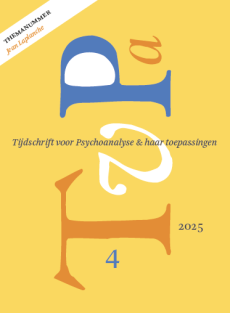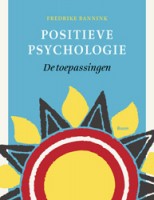Gedachten over de hoge ouderdom
Summary
Since a large number of people now live to an advanced age, it is important to understand how extreme old age can be experienced as a meaningful stage of life despite limitations and losses.
Psychoanalysts have ignored the psychological problems of old age for a long time; the idea that old people are unable to change has been partly responsible for this neglect.
Central to the last stage of life is the loss of loved ones and the failure of mental and bodily functions. An old person’s ability to cope with such loss and failure is dependent on the ability to maintain self-esteem.
Psychoanalytical guidance is urged for old people in order to help them cope with the narcissistic problems that are associated with old age.
Literatuur
- Erikson, E. (1959/1980), Identity and the Life Cycle, W.W. Norton & Company, Londen.
- Cohen, N.A. (1982), On Loneliness and the Aging Process. International Journal of Psycho-Analysis 63, p. 149-155.
- Freud, S. (1915), Actuele beschouwingen over oorlog en dood. Nederlandse Editie: Cultuur en Religie 3. Boom, Meppel, p. 37-68.
- Frijling-Schreuder, E.C.M. (1955), Preventie van neurotische gezinsrelaties, Van Gorcum, Assen.
- King, P. (1980), The Life Cycle as indicated by the nature of the transference in the psychoanalysis of the middle-aged and elderly. International Journal of Psycho-Analysis 61, p. 153-160.
- Vaillant, G.E., en S.H. Koury (1993), Late Midlife Development. In: G.H. Pollock en S.I. Greenspan (Ed.), The Course of Life, Volume 6, Late Adulthood. International University Press, Madison, p. 1-22.
 © 2009-2026 Uitgeverij Boom Amsterdam
© 2009-2026 Uitgeverij Boom Amsterdam
ISSN 1382-516x
De artikelen uit de (online)tijdschriften van Uitgeverij Boom zijn auteursrechtelijk beschermd. U kunt er natuurlijk uit citeren (voorzien van een bronvermelding) maar voor reproductie in welke vorm dan ook moet toestemming aan de uitgever worden gevraagd:
Behoudens de in of krachtens de Auteurswet van 1912 gestelde uitzonderingen mag niets uit deze uitgave worden verveelvoudigd, opgeslagen in een geautomatiseerd gegevensbestand, of openbaar gemaakt, in enige vorm of op enige wijze, hetzij elektronisch, mechanisch door fotokopieën, opnamen of enig andere manier, zonder voorafgaande schriftelijke toestemming van de uitgever.
Voor zover het maken van kopieën uit deze uitgave is toegestaan op grond van artikelen 16h t/m 16m Auteurswet 1912 jo. Besluit van 27 november 2002, Stb 575, dient men de daarvoor wettelijk verschuldigde vergoeding te voldoen aan de Stichting Reprorecht te Hoofddorp (postbus 3060, 2130 KB, www.reprorecht.nl) of contact op te nemen met de uitgever voor het treffen van een rechtstreekse regeling in de zin van art. 16l, vijfde lid, Auteurswet 1912.
Voor het overnemen van gedeelte(n) uit deze uitgave in bloemlezingen, readers en andere compilatiewerken (artikel 16, Auteurswet 1912) kan men zich wenden tot de Stichting PRO (Stichting Publicatie- en Reproductierechten, postbus 3060, 2130 KB Hoofddorp, www.cedar.nl/pro).
No part of this book may be reproduced in any way whatsoever without the written permission of the publisher.
Nieuwsbrief Boom Psychologie
Meld u nu aan en ontvang maandelijks de Boom Psychologie nieuwsbrief met aantrekkelijke aanbiedingen en de nieuwe uitgaven.
Aanmelden


